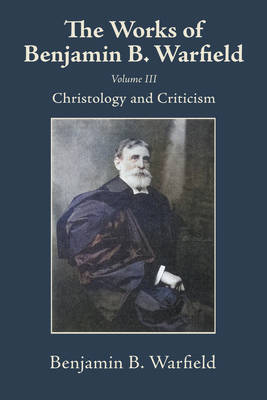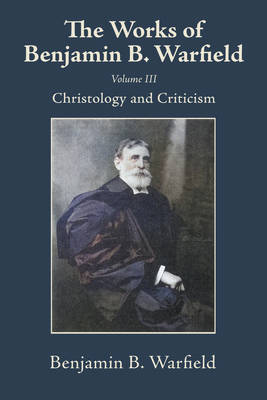
Je cadeautjes zeker op tijd in huis hebben voor de feestdagen? Kom langs in onze winkels en vind het perfecte geschenk!
- Afhalen na 1 uur in een winkel met voorraad
- Gratis thuislevering in België vanaf € 30
- Ruim aanbod met 7 miljoen producten
Je cadeautjes zeker op tijd in huis hebben voor de feestdagen? Kom langs in onze winkels en vind het perfecte geschenk!
- Afhalen na 1 uur in een winkel met voorraad
- Gratis thuislevering in België vanaf € 30
- Ruim aanbod met 7 miljoen producten
Zoeken
The Works of Benjamin B. Warfield, Volume III
Christology and Criticism
Benjamin B Warfield
Paperback | Engels
€ 66,95
+ 133 punten
Uitvoering
Omschrijving
Benjamin B. Warfield (1851-1921) received the degree of Doctor of Divinity in 1880 and that of Doctor of Laws in 1892 from the College of New Jersey; that of Doctor of Laws from Davidson College in 1892; that of Doctor of Letters from Lafayette College in 1911; and that of Sacrae Theologiae Doctor from the University of Utrecht in 1913. Warfield was a voluminous writer. During his lifetime he published the following volumes: Introduction to the Textual Criticism of the New Testament (1886); The Gospel of the Incarnation (1893); Two Studies in the History of Doctrine (1893); The Right of Systematic Theology (1897); The Significance of the Westminster Standards (1898); Acts and the Pastoral Epistles (1902); The Power of God Unto Salvation (1903); The Lord of Glory (1907); Calvin as a Theologian and Calvinism Today (1909); Hymns and Religious Verse (1910); The Saviour of the World (1915); The Plan of Salvation (1915); Faith and Life (1916); and Counterfeit Miracles (1918). The bulk of his writings, however, made their first appearance in Bible dictionaries, encyclopedias and theological magazines, especially the Presbyterian and Reformed Review and its successor the Princeton Theological Review. Following his death, sufficient of this material to make ten large volumes was selected by his literary executors, Ethelbert D. Warfield, William Park Armstrong and Caspar Wistar Hodge, and published by the Oxford University Press.
Specificaties
Betrokkenen
- Auteur(s):
- Uitgeverij:
Inhoud
- Aantal bladzijden:
- 466
- Taal:
- Engels
Eigenschappen
- Productcode (EAN):
- 9798385259182
- Verschijningsdatum:
- 28/08/2025
- Uitvoering:
- Paperback
- Formaat:
- Trade paperback (VS)
- Afmetingen:
- 140 mm x 216 mm
- Gewicht:
- 535 g

Alleen bij Standaard Boekhandel
+ 133 punten op je klantenkaart van Standaard Boekhandel
Beoordelingen
We publiceren alleen reviews die voldoen aan de voorwaarden voor reviews. Bekijk onze voorwaarden voor reviews.









